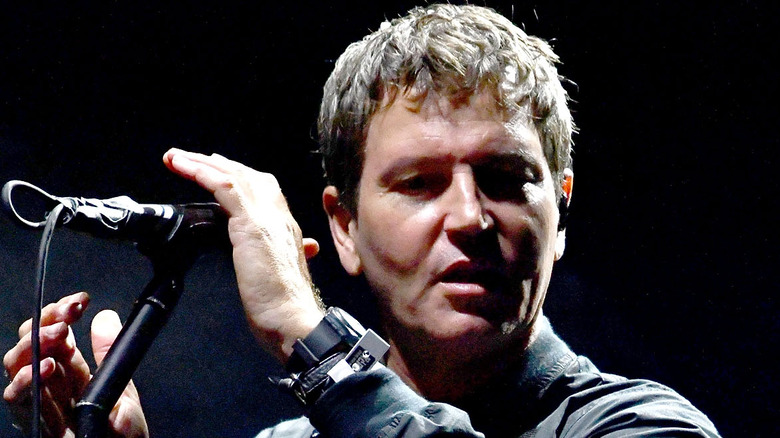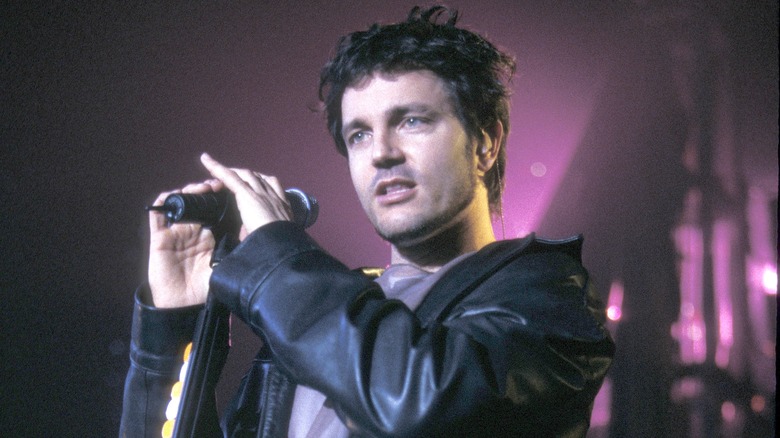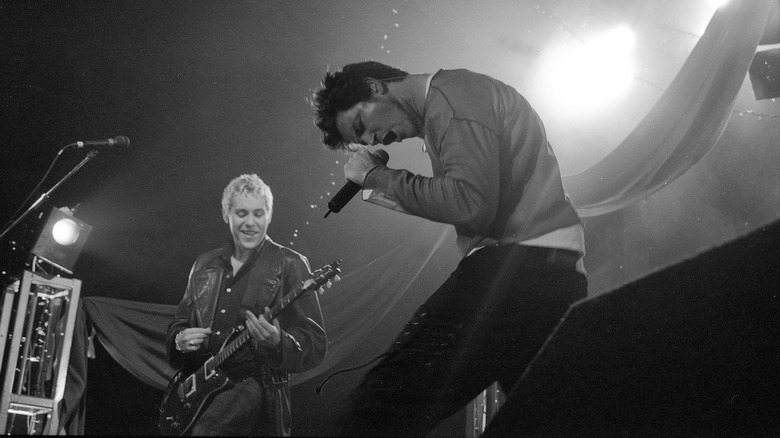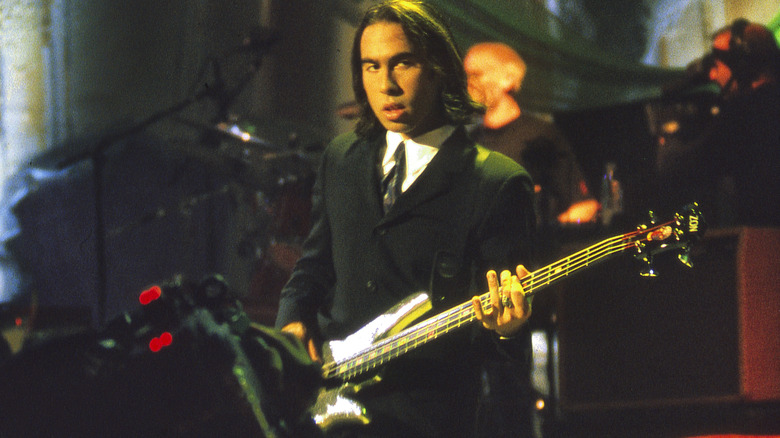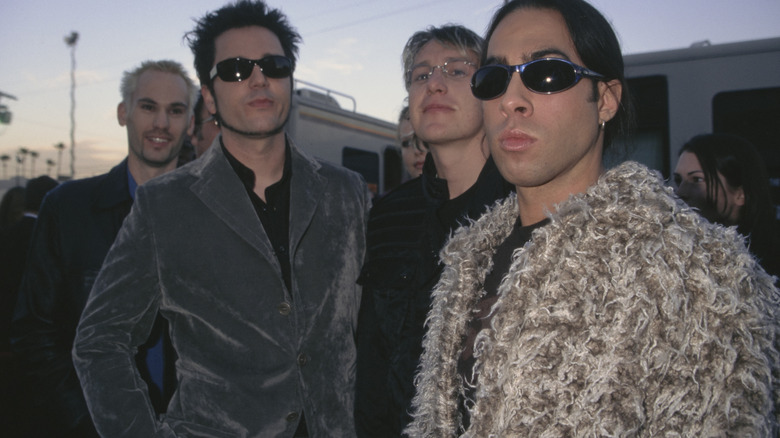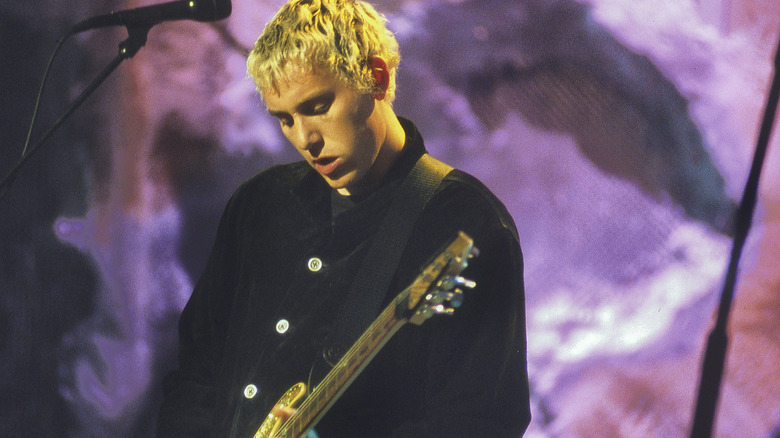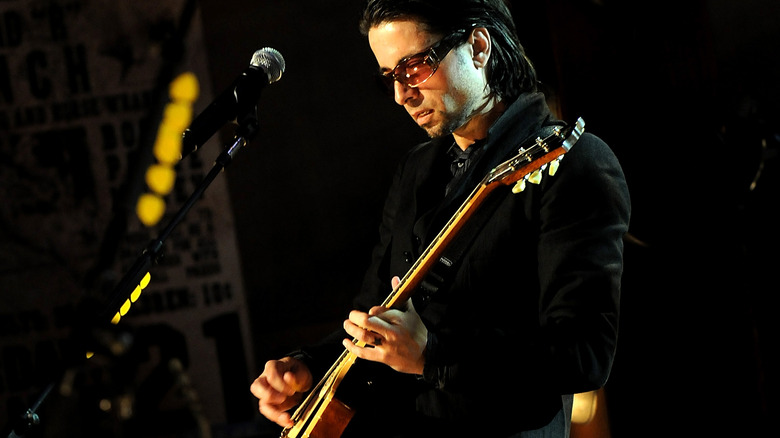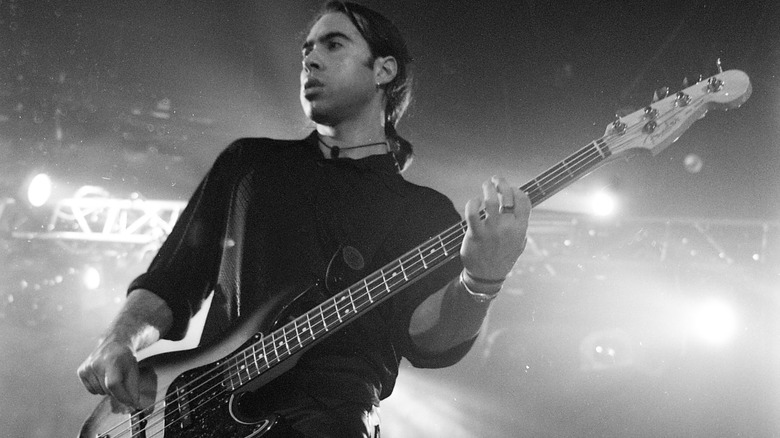The Tragic Real-Life Story Of Third Eye Blind
The thing about the internet is that it's a great place to find some fascinating — and surprising — statistics. Take the popularity of Third Eye Blind. Sure, "Semi-Charmed Life" is something of an anthem for people of a certain age, but according to YouGov, they're actually the nation's 20th-most-popular alternative indie artist. In terms of overall music popularity, they come in at No. 585, which sounds pretty low on the list. But they're sitting right above, for instance, Joe Jonas and Roger Daltrey.
Third Eye Blind hit it big out of the gate with their 1997 self-titled debut album. That was a long time coming: Lead singer Stephan Jenkins had been writing songs for years before he found fame (per Billboard).
He had lofty ideas about his influences, too. Jenkins wasn't into the moody, nihilistic grunge movement, and he made a point of standing apart from what had been popular. "I had more of a rage to live, to reshape the world on my own terms," he said. "My mindset was more eros, erotic, the ferocity of demanding to live on your terms."
Idealistic? Absolutely. But wide-eyed idealism and ambition will only get a band so far, and along the way Third Eye Blind have had to travel a rocky road.
The heartbreaking inspiration behind Jumper
The Stephan Jenkins-led Third Eye Blind have always been pretty upfront about their views, including their performances for causes, such as a 2016 benefit supporting trans kids confronting restrictive-bathroom legislation. In 2020, Jenkins spoke with Thrasher about his motivations for his songs.
The interview turned to the band's hit "Jumper." It had just turned 23 years old, and its anti-bullying sentiment was as relevant as ever. Jenkins explained the heartbreaking story behind the song: "It was about a friend who jumped off the Coronado Bridge because he was gay, and getting bullied. ... I was like, 'This is what I would say to that kid.' But he's dead, so it's kind of noir. ... But it has become this lifted-up moment because the message of it is that we have more understanding for each other, that we have more ability to embrace each other than we give each other credit for."
Jenkins added that he was often asked if it was necessary to make a gay kid the song's focus, and he'd reply that it was integral to the song. More than two decades after the song's release, it remains a positive anthem for a younger generation, per Yahoo!, performed by artists such as Demi Lovato.
If you or anyone you know is having suicidal thoughts, please call the National Suicide Prevention Lifeline by dialing 988 or by calling 1-800-273-TALK (8255).
Wounded came from a very dark place
Third Eye Blind released their album "Blue" in 1999, and its second track, "Wounded," would not only continue to resonate but would take on a whole new life years later with the #MeToo movement. The song became an anthem of understanding for many, and the trauma that triggered it was very real.
"It's about a friend of mine and she got raped," singer/songwriter Stephan Jenkins told Yahoo!, "and she was so out and extroverted, and she really pulled back into herself [after the assault]. And it's a song about how her community of friends could sort of bring her back into the fold and bring her into that sense of fullness and aliveness."
When Jenkins spoke with Forbes in 2018, he made it clear that he wasn't living in the past and holding onto his music in a nostalgic way — and that included old hits like "Wounded." He kept performing it because "I can see that taking on sort of different resonance in the MeToo era, and that makes me feel really good about writing that song." Long after the song was released, he saw people living with the same trauma and needing that type of hope, and he remained grateful that he could capture the hope after the pain.
If you or anyone you know has been a victim of sexual assault, help is available. Visit the Rape, Abuse & Incest National Network website or contact RAINN's National Helpline at 1-800-656-HOPE (4673).
A Third Eye Blind-led fight hospitalized a member of Green Day
There are band rivalries, and then there's taking things too far. Back in 1998, things went too far.
Third Eye Blind and Green Day were both performing at the annual KROQ Weenie Roast and Fiesta in Irvine, California. During Green Day's set, 3EB's Arion Salazar rushed onstage and headed for bassist Mike Dirnt. The story of what happened was told in a few different ways — by Rolling Stone and MTV — but the gist is that what 3EB later called "an inter-band prank" was no joke to Green Day. Dirnt took a swing at Salazar when Salazar grabbed him, and the fight moved into unlighted areas off-stage. Dirnt was then hit in the back of the head with a bottle, sending him to the hospital with a skull fracture.
It's still unclear who hit Dirnt — the incident was investigated, says MTV, and the blow was blamed on a fan and on Salazar. The probe eventually didn't reveal who the culprit was, and Salazar later issued an official apology for starting the fight.
No one was happy about Third Eye Blind, Inc.
In 2002, five years after "Semi-Charmed Life" catapulted Third Eye Blind to superstardom, The New York Times ran a behind-the-scenes piece about the band. A law degree might come in handy for understanding it, but here are the basics.
When the band was formed, in 1994, an agreement was reached saying that the bandmates had equal say in areas like royalties and earnings. But the group was set up as a corporation called Third Eye Blind, Inc., with singer/songwriter Stephan Jenkins as the only shareholder and owner — which the other band members said they weren't aware of for years.
It basically meant that Jenkins owned every share in the band, received all the payments, and was in charge of distributing the money. In addition to financial control, he also held all creative control. Some of the members said that the process worked, but others, like original bassist Jason Slater, said that it essentially gave Jenkins a stranglehold on every aspect of the band — including what songs were recorded. According to Slater, Jenkins would often refuse to consider others' contributions that might result in sharing the profits from songwriting credits and other areas. It also meant that even though some of the band's best songs were collaborations between Jenkins and Kevin Cadogan, profitability limits were put in place.
"Stephan's been doing that same thing to everybody forever," Slater said. "He doesn't want to lose the façade of him being the musical genius."
The firing of Kevin Cadogan led to a messy lawsuit
According to The New York Times' exposé of Third Eye Blind's legal issues (up to 2002, at least), guitarist Kevin Cadogan was in the dark for three years about the legal setup behind the fact that the band was owned by a corporation, which was, in turn, owned by singer/songwriter Stephan Jenkins.
When the situation came to light in 1999, Cadogan took a stand and refused to sign a deal for making an EP. Jenkins renegotiated the deal, wrote Cadogan out of it, and bid him farewell on the heels of their performance at the Sundance Film Festival. A replacement guitarist was already lined up, and that's when Cadogan realized his hotel had been booked not under the band's name but his own.
Cadogan ended up suing over unpaid royalties, which he claimed had been withheld behind the umbrella of the corporation (via Billboard). Part of his lawsuit was based on a verbal agreement he'd had with Jenkins, ensuring an equal and fair split of all assets, according to his testimony. The lawsuit dragged on for two years, and in 2002 the case was settled for an undisclosed amount.
Afterward, Cadogan offered food for thought: "We're taught algebra, geometry, and calculus in school, but what we're not taught is basic law. ... Learn about law, and about statutes of limitations. Then get good lawyers."
The next guitarist sued the band too
The New York Times says that by the time guitarist Kevin Cadogan found out he was fired, his replacement had already been hired. That was Anthony Fredianelli, and although his tenure lasted a little longer — nine years — it ended just as contentiously.
As The Hollywood Reporter explains, Fredianelli was hired as a utility musician, which meant he wasn't a full-fledged member of the band. He negotiated for $1,750 per week when there were gigs, and a $1,000-per-week retainer for downtime. During the lawsuit that followed, he testified that he was told the arrangement would continue for two years of probation, and that afterward he would be a full band member and, more important, that he'd have a stake in ownership.
After Cadogan's legal issues were off the board, Fredianelli was given 25 percent of the profits made from touring. But in 2008, Stephan Jenkins bailed, briefly, leaving three members to split profits three ways. Jenkins returned, cut everyone's profits back to 25 percent, and told them they needed to get on board with suing their manager. Fredianelli testified that he had no knowledge of behind-the-curtain dealings, and, he said, that's when Jenkins turned on him. Fredianelli sued on several grounds, including breach of contract and failure to receive payments.
A jury found he had not been paid all that he was entitled to, and Fredianelli was awarded nearly $448,000.
Arion Salazar? Yep, there are lawsuits involving him, too
Arion Salazar left Third Eye Blind in 2009, and he signed what The Mercury News calls a "termination and release agreement." In the contract, Salazar agreed to cut all legal and financial ties with the band in exchange for a one-time payment of $43,000. If that sounds low for a high-profile band like Third Eye Blind, Salazar thought so too — in hindsight.
RIFF Magazine reported that Salazar headed to court to try to get the agreement overturned, for several reasons. He was in the middle of treatment for drug addiction at the time he signed, and the legal counsel that advised him was the same counsel that represented Stephan Jenkins and 3EB. That's pretty much the definition of a conflict of interest, and Salazar said that he was unaware of it at the time.
Salazar said that he was misled into signing a bad-faith agreement. He got in touch with companies such as SoundExchange, which collect royalties and pay artists directly, circumventing the corporation Jenkins had set up. SoundExchange froze all of 3EB's royalties in response, which led to 3EB countersuing Salazar.
Messy and bitter? Absolutely. And according to court documents, it was dismissed.
Stephan Jenkins is Rob Thomas' blueprint for what not to be
There's little better than witnessing the success of an honestly nice person. And while not everyone can aspire to be one of the Dolly Partons of the world, it's encouraging to hear generally inspiring stories of the ultra-rich and super-famous being good.
Most of the tales about Third Eye Blind singer/songwriter Stephan Jenkins are the precise opposite, and the feelings that countless people have about him are perhaps most efficiently summed up by singer-songwriter-producer John Vanderslice, who said (via The Ringer), "Stephan Jenkins has caused a lot of misery in his lifetime. He's a net negative as a person."
Those sentiments have been echoed by many who have worked with 3EB. Jenkins has gotten some serious hate from, for starters, Eve 6's Max Collins, Smash Mouth's Steve Harwell, and pretty much every former member of 3EB.
Rob Thomas in particular has a massive beef with Jenkins. He explained why in an interview with Spin: When Matchbox Twenty first hit it big and went on tour, frontman Thomas gained about 40 pounds over the course of the shows. Jenkins, he says, felt it necessary to ridicule his weight. "[Jenkins] made fun of me," Thomas said. "Called me a fat guy. Screw you! He has no soul whatsoever. ... I just think, 'You are walking, breathing, living cheese.'" Jenkins' criticisms also helped keep Thomas grounded: "It reminds me that I don't want to be someone people meet and think is entirely self-centered."
Semi-Charmed Life has an oft-overlooked connection to addiction
"Semi-Charmed Life" was, of course, a massive hit. Listen to the lyrics, though, and it's clear why Stephan Jenkins told Rolling Stone that he was shocked that it ever got airplay. There were the rather risqué lyrics — at least for drive-time radio — and then there were the drug references.
Jenkins would only hint at the true story that inspired the drug references in what's arguably the band's biggest hit, and when Rolling Stone asked him if he had really written what he knew, he said that he was absolutely not going on record about whether he had ever taken any drugs. He added that he was just the opposite, but that didn't mean he hadn't seen addiction and its consequences.
"I definitely write about my life and the lives I see," Jenkins said. "It's about a time when my friends and I were at a Primus concert, and somebody brought speed. No one had done it before, and, like, three weeks later, all of my friends were addicted."
If you or anyone you know needs help with addiction issues, help is available. Visit the Substance Abuse and Mental Health Services Administration website or contact SAMHSA's National Helpline at 1-800-662-HELP (4357).
What about all those Berkeley claims?
It's an oft-repeated and honestly inspirational tale about Stephan Jenkins. The story — which has appeared in dozens of places, including in his biography on Big Think — is that although his dyslexia made school difficult for him, he worked hard, headed to UC Berkeley, and graduated as valedictorian. In some versions, he also recounts how he went back to visit an elementary-school teacher who said he would never amount to anything, and called out the teacher for the insults.
Great story, but according to Gawker, it's not actually true.
Gawker did a deep dive and found one whopping problem with the story: UC Berkeley doesn't even have a valedictorian. Instead, the school gives out University Medals, and Jenkins isn't even on the list of recipients kept there since 1871. Gawker reached out to Berkeley for answers, and reported that the school's response was "bemused." Berkeley also confirmed that it had no records of Jenkins' claims.
Jenkins didn't respond to inquiries from Gawker, but Stereogum got wind of the exposé and asked him about it — and the "valedictory address" that he gave. He eventually explained that "valedictorian" in this case meant someone who got good grades in the department, but he also summarized the situation with "I really don't want to participate in that narrative."
The death of bassist Jason Slater
In 2020, TMZ broke some heartbreaking news: Third Eye Blind's original bassist, Jason Slater, had died at age 49.
The news was confirmed by his daughter, who said that the official cause of death was liver failure. Slater, she said, had kept his diagnosis a secret from everyone — including her — and added that she had found out that he was sick only about a month before his death.
Slater had joined the band before there really was a band — according to People, videos he posted in 2008 showed early recording sessions featuring the earliest incarnation of Stephan Jenkins' group. Slater added that he didn't know anyone who joined after he left, saying, "The first three years, it was just Stephan and I writing songs and recording demos."
After his death, 3EB acknowledged that they hadn't spoken to him since 1996, adding, "When a spirited member of the music scene is taken too soon, it is always a sad time."
Stephan Jenkins' mother died while he was onstage
On February 14, 2018, Third Eye Blind frontman Stephan Jenkins tweeted, "As many know, my mom died while I was on stage Sat night. I was fortunate to have my touring family to share my grief."
Along with the tweet, he posted a link to a now-defunct Crowdrise page that, according to Hollywood.com, allowed followers and fans to donate to the Alzheimer's Association in his mother's name. Elizabeth Mary Kirk had been diagnosed with Alzheimer's, and it was her eventual cause of death.
3EB performed a show in Bensalem, Pennsylvania, on February 10, and at the time it was clear that Jenkins knew his mother had limited time left. A video that was shot from the audience during the concert showed him struggling to contain his emotions as he and the band prepared to play "God of Wine," a song he had written for her.
